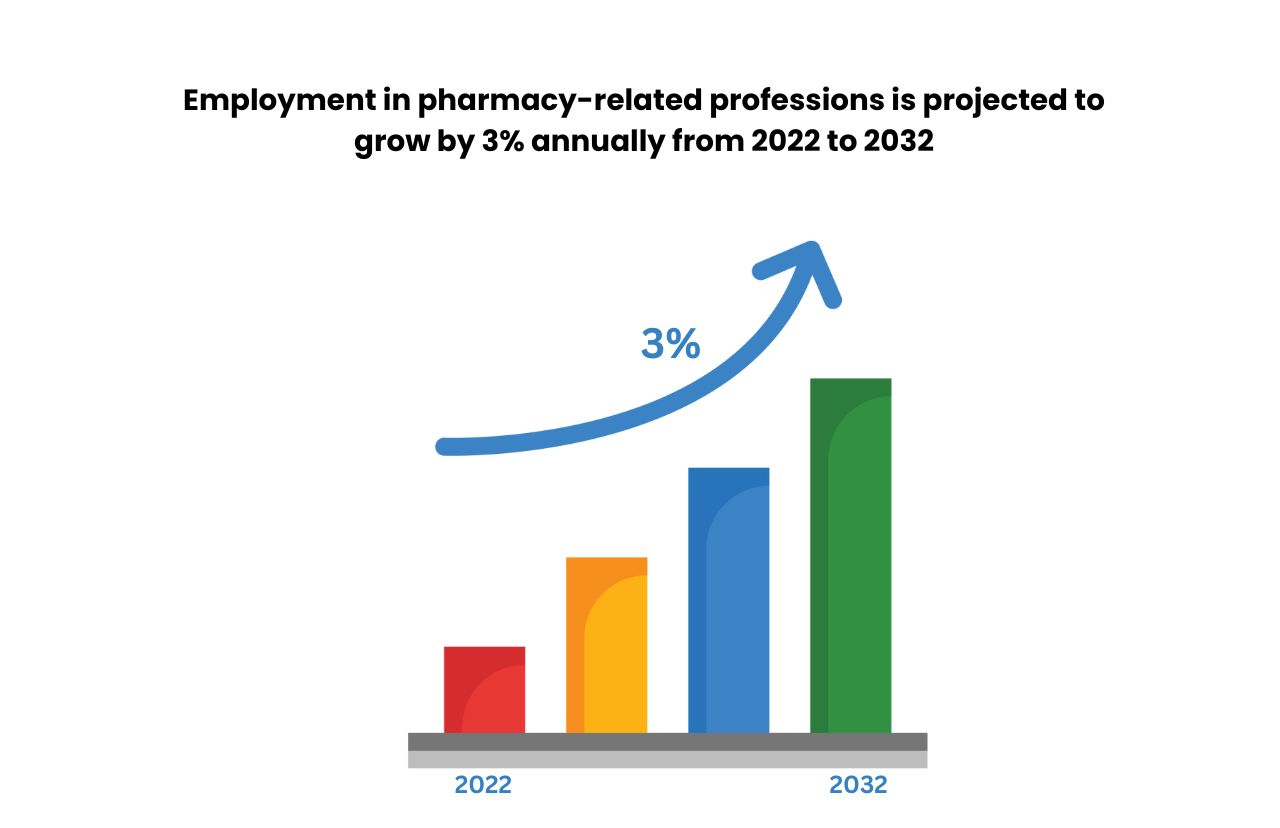
Are you looking to start a career in pharmacy? This guide will walk you through the different job options, required skills, and steps to build a successful pharmacy career in India.
The Indian pharmaceutical industry is expected to reach a market size of US$ 65 billion by 2024, around US$ 130 billion by 2030, and US$ 450 billion by 2047
Have you ever wondered what is the different option as a career in pharmacy are available
after completing a pharmacy degree? Or maybe you’re curious about where a
career in pharmacy can take you in the long run.
Whether you’re just starting to explore the field or already
have a degree in hand, there are many paths you can follow in pharmacy, each
having unique opportunities.
And the question here is, how do you decide which one is
best for you?
In this guide, we’ll walk through the various career options
in pharmacy, from community settings to research and development, and provide
you with the insights you need to make informed choices as you plan your
career.
Ready to explore where your pharmacy degree can take you?
Let’s get started!
Have you ever thought about why pharmacy could be a great
fit for your career? If you enjoy science, have an interest in healthcare, and
want to make a difference in people’s lives, pharmacy might be the right choice
for you.
It’s a profession that offers a unique blend of working with
patients, engaging in research, and even exploring regulatory and
entrepreneurial roles.
But what makes pharmacy stand out?
One of the main reasons people choose pharmacy as a career after 12th
is the consistent demand for pharmacists.
Healthcare is always evolving, and with it, the need for
skilled professionals in pharmacies continues to grow. Whether you’re working
in a hospital, a retail pharmacy, or even in a research lab, your expertise
will always be in demand.
Another appealing aspect is the wide range of career paths
you can explore. Do you want to interact with patients, helping them manage
their medications and improve their health? Or perhaps you’re more interested
in research, developing new treatments and therapies? There’s also the
opportunity to work in regulatory roles, ensuring the safety and effectiveness
of medications. The choice is yours!
If you’re entrepreneurial, pharmacy offers opportunities for
specialization or even starting your own business. You could open a pharmacy,
start a consulting firm, or focus on a niche area within the field.
Not to mention, pharmacists enjoy competitive salaries and
there’s always room for growth in this profession. Whether you want to climb
the career ladder or deepen your expertise, pharmacy provides plenty of
opportunities to develop and expand your skills.
So, why not take a closer look at what a pharmacy career can
offer you?

Pharmacy offers many job opportunities in different areas.
So, what are some of the main roles you can take on in pharmacy, and what do
they involve? Let’s take a closer look at a few common career paths you can
explore.
Pharmacy offers several well-known roles, and these
positions form the backbone of the profession. Let’s look at what each role
involves and the career in pharmacy salary you can expect:
Retail pharmacists work in local pharmacies, such as those
found in shopping centers or standalone drugstores. Their main tasks include
dispensing medications, providing guidance on how to take medicines, and
answering any patient questions about their prescriptions. They also offer
advice on over-the-counter products and general health.
Average Salary: ₹2-5 lakh per year.
Hospital pharmacists work in medical settings like hospitals
or clinics. They are responsible for managing medications for patients,
ensuring that prescriptions are safe and effective. They also work closely with
doctors, nurses, and other healthcare professionals to adjust medications as
needed for different patient conditions.
Average Salary: ₹3-7 lakh per year.
Clinical pharmacists focus more on patient care. They work
in hospitals or clinics, where they directly interact with patients and
healthcare teams to ensure that the prescribed medications are the best choice
for the patient’s health. Their role involves optimizing drug therapy, managing
side effects, and advising doctors on the best treatment options.
Average Salary: ₹4-8 lakh per year.
Community pharmacists typically work in smaller, local
settings. They provide advice on medications, health conditions, and prevention
strategies. They are often the first point of contact for people seeking advice
on minor health issues or over-the-counter remedies. Their work includes
counseling patients and ensuring they understand how to use medications safely.
Average Salary: ₹2-5 lakh per year.
These traditional pharmacy roles are key to patient care and
contribute significantly to the healthcare system. While the salaries vary,
they offer a stable and respected career in the field.
Have you ever wondered how new medicines are created or what
goes into developing a life-saving drug? Pharmacy graduates can have a big
impact in this area through careers in Research and Development (R&D).
These roles focus on discovering and improving drugs that help patients live
healthier lives. Here are two key roles in R&D:
Research scientists in pharmacy are at the forefront of drug
discovery. They work on developing new medications and treatments for a wide
range of diseases. Their work involves conducting experiments, analyzing data,
and collaborating with other professionals to bring new drugs from the lab to
the marketplace. They are the people who create new ideas and improve
healthcare for the future.
Salary Range: ₹5-10 lakh per year or more, depending on
experience.
Analytical chemists play a crucial role in ensuring that
drugs are safe and effective. They focus on testing and analyzing medications
to make sure they meet the required standards for quality and consistency.
Their work involves using advanced technology to test drug samples and make
sure they will work as intended once they reach patients.
Salary Range: ₹5-10 lakh per year or more, depending on
experience.
R&D careers are a great fit for those who enjoy
problem-solving and want to make a difference in healthcare by developing new
treatments. These roles also offer competitive salaries, especially as you gain
experience. If you’re curious about drug development or love the idea of being
involved in breakthrough medical research, these roles could be a perfect match
for you. Would you be interested in playing a role in the next big medical
discovery?
Have you ever thought about how pharmaceutical companies
ensure their products are safe for public use? Regulatory affairs professionals
play a crucial role in making sure that drugs and medicines meet legal, safety,
and quality standards before they reach patients. These professionals work
closely with government agencies and companies to ensure compliance with
regulations. Here are two important roles in this field:
Drug inspectors are responsible for monitoring the quality
and safety of medicines. They inspect manufacturing facilities, check for
compliance with industry standards, and make sure that medications are produced
in a safe and controlled environment. They also conduct regular audits to
ensure that the medicines being sold to the public are both effective and free
from harmful substances.
Salary: Starting at ₹4-8 lakh per year.
Regulatory affairs specialists work on ensuring that
pharmaceutical products meet all legal and regulatory requirements. They help
companies navigate complex government regulations, prepare documents for
product approvals, and ensure that the company follows all necessary
guidelines. Their work involves keeping up to date with changing laws and
regulations to avoid compliance issues.
Salary: Starting at ₹4-8 lakh per year.
Regulatory affairs careers are perfect for those who enjoy
attention to detail and are interested in the legal and ethical aspects of the
pharmaceutical industry. These roles also offer solid job stability and a
competitive salary. If you like the idea of working behind the scenes to make
sure medicines are safe for the public, this might be a career path worth
considering. Does helping ensure the safety of medicines sound like a role
you’d want to take on?
In the pharmaceutical industry, quality isn't just a
goal—it's a must. This is where Quality Control (QC) and Quality Assurance (QA)
professionals come in. These roles are all about making sure that every
medicine is safe, effective, and consistent. Let's explore two key positions in
this field and what they bring to the table.
As a QC analyst, your main job is to test both raw materials
and finished products. You’ll be ensuring that every batch of medicine meets
strict quality standards. This involves running tests to check things like
strength, purity, and consistency. If something’s off, you’ll catch it early,
preventing potential issues before they reach the public. It’s a detailed job,
but it’s crucial for keeping the quality of medications high.
Salary: ₹4-8 lakh per year.
QA managers have a bigger-picture role. They oversee the
whole manufacturing process, ensuring that everything complies with industry
regulations. From conducting audits to fine-tuning processes, they make sure
that every step of production follows safety guidelines and quality standards.
They work closely with production teams to keep everything running smoothly and
on track.
Salary: ₹6-12 lakh per year, depending on experience.
If you’re someone who enjoys working with systems and
ensuring that everything is done right, both QC and QA roles offer a fulfilling
career. You get to play a key role in making sure only the best products make
it to the market, and with good pay and career growth, it's a solid path to
take. Does making sure medicines are safe and up to standard sound like
something you'd be proud to do every day?
If you have a passion for sharing knowledge and helping
others grow, a career in academia could be the perfect fit. As a pharmacy
professor or lecturer, you’ll play a key role in shaping the next generation of
pharmacists. Teaching allows you to not only impart your expertise but also
inspire students to pursue meaningful careers in the field.
If You're looking for the best career in pharmacy as a Professor or lecturer then it would be best options for you if you are passionate about teaching. In this role, you'll be responsible for educating pharmacy
students in universities or colleges. Whether it's teaching the fundamentals of pharmacology, drug design, or patient care, your role is crucial in providing
students with the knowledge and skills they need to succeed. You’ll also have
the opportunity to engage in research and contribute to the academic community
by publishing papers and conducting studies.
Salary: ₹6-12 lakh per year, depending on experience and
institution.
Career in pharmacy as a Teaching offers the chance to make a real impact on the future of healthcare by guiding students toward successful careers. It’s also a field that allows for a balance of classroom teaching, research, and continuous learning. If you enjoy mentoring and helping others reach their potential, academia could be a rewarding path.
Would you like to inspire future
pharmacists and contribute to the growth of the industry?
If you're someone who enjoys taking initiative and wants to
make your own mark in the pharmacy field, entrepreneurship could be a path
worth considering. Starting your own pharmacy or consultancy not only offers
the freedom to work independently but also provides the opportunity to create a
business that serves the needs of your community.
As a pharmacy owner, you’ll manage your own business,
providing medications, health advice, and wellness products to customers.
You'll have the chance to connect with your community and build strong
relationships with your customers while ensuring they get the best possible
care. Running your own pharmacy requires knowledge of both healthcare and
business management, as you’ll be responsible for inventory, staff, customer
service, and compliance with regulations.
Salary: Potentially ₹8-15 lakh per year, depending on the
size and success of the business.
If you're interested in a more flexible business option,
becoming a pharmacy consultant allows you to offer expert advice to healthcare
providers, pharmaceutical companies, or even individual patients. As a
consultant, you’ll use your knowledge of drugs, regulations, and best practices
to help organizations improve their operations, meet regulatory standards, or
optimize patient care. This career can be very fulfilling and financially
beneficial, especially if you focus on a specialized field.
Salary range from ₹6-12 lakh per year, based on your skills
and the clients you work with.
Starting your own business in pharmacy can provide both
financial rewards and personal satisfaction. It gives you the freedom to create
a work environment and service model that aligns with your values. If you’re
driven, entrepreneurial, and have a passion for pharmacy, this might be the
right fit. Does the idea of running your own business and making your own
decisions sound appealing to you?
For those who value job stability, good benefits, and the
opportunity to make a difference in public health, government and public sector
jobs in pharmacy are a solid option. These roles provide a sense of security
and the chance to work in meaningful positions that directly impact the
well-being of the population.
A drug inspector works with government agencies to ensure
that pharmaceutical products are safe, effective, and meet all regulatory
requirements. They inspect manufacturing facilities, oversee the distribution
of medications, and ensure that pharmacies and drugstores comply with the law.
This role is essential for maintaining the integrity of the pharmaceutical
industry and protecting public health.
Salary: ₹6-10 lakh per year, depending on the level of
experience and government sector.
Pharmacists working in government-run hospitals or clinics
play a vital role in patient care. They ensure that patients receive the
correct medications and dosages, counsel them on proper use, and collaborate
with healthcare teams to manage treatment plans. Working in the public sector
offers the chance to directly impact the health of individuals, especially in
underserved areas.
Salary: ₹4-8 lakh per year, with additional benefits such as
healthcare, pension plans, and more.
Government and public sector pharmacy roles offer job
security, a steady income, and the chance to serve the public. If you’re
looking for a stable career with the opportunity to make a tangible impact on
society, these positions are worth considering. Would you like to work in an
environment that values service and offers long-term stability?
If you’re looking to deepen your knowledge and expertise in
pharmacy, pursuing higher education or specialization can open up even more
career opportunities. Advanced degrees allow you to focus on specific areas of
pharmacy, making you a sought-after professional in the field.
An M.Pharm allows you to specialize in fields like
pharmaceutics, pharmacology, or medicinal chemistry. By focusing on areas such
as drug formulation, drug action, and drug development, you gain in-depth
knowledge that can lead to roles in research, teaching, or advanced clinical
practice. By specializing in a specific area, you can set yourself apart in the
job market.
Salary: ₹6-12 lakh per year, depending on your
specialization and role.
Pharm.D is a clinical-focused program that trains
pharmacists to work directly with patients. This degree is ideal for those who
want to provide direct patient care, optimize medication therapy, and work in
clinical settings like hospitals or healthcare facilities. Pharm.D
professionals are experts in pharmacology and drug therapy management, making
them an essential part of healthcare teams.
Salary: ₹5-10 lakh per year, depending on experience and job
setting.
For those interested in the business side of pharmacy, an
MBA in Pharmaceutical Management combines business skills with pharmaceutical
knowledge. This program prepares you for leadership roles in pharmaceutical
companies, healthcare organizations, or regulatory bodies. You’ll learn about
marketing, strategy, operations, and management within the pharmaceutical
industry.
Salary: ₹8-15 lakh per year, depending on the company and
position.
Higher education and specialization offer the opportunity to
advance your career, whether you want to work in research, clinical settings,
or management. With the right qualifications, you can take on leadership roles,
expand your skills, and earn a competitive salary. Are you interested in
becoming an expert in a specific area of pharmacy and exploring advanced career
paths?
While many people think of pharmacy as just dispensing
medications or working in hospitals, there are numerous non-traditional roles
where pharmacy professionals can make a significant impact. These positions
combine pharmacy knowledge with other industries, opening doors to innovative
careers that blend healthcare with technology, communication, and safety.
Medical writers play an important role in the pharmaceutical
industry by creating content that communicates complex scientific and medical
information in a clear and understandable way. They may write articles,
research papers, clinical trial reports, or marketing materials for
pharmaceutical companies. This role is perfect for those with a knack for
writing and an understanding of pharmacy and medicine.
Salary: ₹5-8 lakh per year, depending on experience and the
company.
Pharmacy informatics specialists work at the intersection of
pharmacy and technology. They help implement and manage technology systems in
pharmacies and healthcare organizations to improve patient care, streamline
operations, and ensure the efficient use of medications. This role involves
using data and technology to optimize healthcare delivery and make better
decisions in drug therapy management.
Salary typically range from ₹7-12 lakh per year, based on
your experience and the organization you work with.
Pharmacovigilance experts focus on the safety of medications
after they are released to the market. They monitor, assess, and report on the
risks and side effects of drugs, ensuring that any potential issues are
identified and addressed promptly. This role is crucial for maintaining patient
safety and ensuring that medications continue to meet safety standards.
The career in pharmacovigilance's salary usually falls between ₹6-10 lakh per year,
depending on your experience and the company.
These non-traditional pharmacy roles offer a unique way to
apply your pharmacy education in innovative areas. If you're interested in
working at the crossroads of technology, safety, or communication, these
careers can provide exciting challenges and the opportunity to make a real
impact. Would you enjoy working in one of these creative and dynamic roles
where pharmacy knowledge meets other fields?

If you're ready to begin your career in pharmacy, the first
thing to do is chart a clear path. Let’s break down the essential steps to help
you navigate your journey into this diverse and growing field.
The foundation of your pharmacy career starts with selecting
the right course. Every course offers its own unique opportunities and
requirements. Here’s a look at your options:
This is a 2-year course that provides the essential skills
for entry-level positions in pharmacies. It’s ideal for those who want to start
their career quickly and get hands-on experience. After completing this
diploma, you can work as a retail pharmacist, community pharmacist, or even in
small-scale pharmacies.
The B.Pharm is a 4-year undergraduate program that offers
more in-depth knowledge of pharmacy, covering subjects like pharmacology, drug
interactions, and patient care. With a B.Pharm, you can explore a variety of
career paths, from retail and hospital pharmacy to research and drug
manufacturing.
Pharm.D is a 6-year course that focuses on clinical pharmacy
practice. This program is perfect if you want to work directly with patients
and healthcare teams to manage medications, optimize therapy, and contribute to
improving patient outcomes. After completing this degree, you can become a
clinical pharmacist, work in hospitals, or even pursue academic roles.
Choosing the right course depends on what kind of work you want to do in the future and how long you’re willing to study. Each path offers unique opportunities, so think about which direction aligns best with your interests. Are you ready to choose the course that will help you reach your career goals? If you need help how you can choose the best pharmacy college then read this.
Once you've chosen your course, it’s time to gain practical
experience. Learning the theoretical concepts in class is essential, but
applying them in real-world settings is where you truly build your skills.
Practical experience is a key step in your pharmacy journey.
Most pharmacy programs require you to complete internships or practical
training, often in hospitals, clinics, or pharmaceutical industries. This is
where you’ll interact with real patients, work with professionals, and see how
the theories and concepts you learned in class are put into practice.
During your internship, you’ll gain experience in tasks
like:
This hands-on experience is invaluable for developing your
skills and understanding how the pharmacy profession works in various settings.
It’s also an opportunity to learn from experienced professionals and get a feel
for the day-to-day challenges of the field.
Why It’s Important
Internships not only enhance your learning but also increase
your employability. Employers prefer candidates who have practical experience
because they are already familiar with the responsibilities and demands of the
job. Completing an internship can help you stand out in a competitive job
market and make it easier to secure a position after graduation.
Are you ready to roll up your sleeves and start learning
through hands-on experience? Gaining practical experience will be one of the
most valuable steps in shaping your pharmacy career.
As you move forward in your pharmacy career, it’s important
to focus on building both technical and soft skills. While the technical side
is crucial for understanding medications, treatments, and patient care, soft
skills are just as important in helping you communicate effectively and build
strong relationships with patients and colleagues.
Here are a few important skills to focus on:
One of the most important aspects of pharmacy is being able
to communicate complex information in an easy-to-understand way. Whether you're
explaining how to take a medication, discussing potential side effects, or
answering patient questions, clear communication is vital. Counseling skills
will help you guide patients in managing their medications and understanding
their treatment plans.
Pharmacy professionals need strong analytical skills to
assess patient needs, evaluate prescriptions, and make informed decisions.
You’ll often encounter situations where you must quickly analyze information to
determine the right medication or dosage, taking into account any potential
drug interactions or side effects. Being able to think critically and solve
problems will set you apart in your role.
Pharmacy requires a high level of accuracy. Even the
smallest mistake in medication dosage can have serious consequences for patient
safety. Paying close attention is important when checking prescriptions and
preparing medications. Additionally, organizational skills are necessary to
manage inventory, maintain accurate records, and stay on top of patient needs
in fast-paced environments like hospitals and retail pharmacies.
By honing these skills, you’ll be able to provide better
care to patients, collaborate effectively with healthcare teams, and handle the
day-to-day responsibilities of a pharmacist. Are you ready to focus on these
essential skills and develop yourself into a well-rounded pharmacy
professional?
After earning your degree, the next step is to explore areas of specialization within the field of pharmacy. Specializing can open doors to advanced roles, increase your earning potential, and allow you to focus on areas that align with your interests and career goals.
Your choice of specialization depends on your interests,
skills, and long-term goals. Do you enjoy patient interactions? Clinical
pharmacy might be the way forward. Are you more inclined toward research or
industry roles? Then consider fields like industrial pharmacy or R&D.
Specializing not only enhances your expertise but also helps
you stand out in the job market. Are you ready to explore a path that aligns
with your strengths and interests? Specialization could be the next big step in building a career in pharmacy.
After building your skills and deciding on a potential
specialization, it’s time to take the plunge into the job market. Applying for
jobs effectively can set the tone for your pharmacy career. Here’s how you can
streamline the process and make the most of available opportunities.
Online Job Portals: Platforms like Naukri.com, Indeed, and
LinkedIn are excellent starting points for finding pharmacy-related jobs.
Customize your profile, upload your updated resume, and actively search for
roles that match your skills.
Campus Placements: Many pharmacy colleges organize campus
recruitment drives, inviting top companies to hire fresh graduates. Don’t miss
these opportunities to secure a position with a reputable organization.
Industry Connections: Networking plays a vital role in the
pharmacy sector. Attend seminars, workshops, and career fairs to connect with
professionals who might guide you toward job openings or referrals.

Several companies are known for hiring pharmacy graduates and offering excellent career prospects. These include:
Employers value candidates who demonstrate a mix of
technical expertise, practical experience, and soft skills. Highlight your
internships, certifications, and any specialized training during the
application process. Tailor your resume to each role, showcasing your relevant
achievements and skills.
Applying for your first job might feel challenging, but with the right preparation and determination, you can land a role that sets the foundation for a successful pharmacy career. Are you ready to take this step and explore the opportunities waiting for you? Every application you send brings you closer to your goals!

The pharmacy profession in India is on an upward trajectory,
driven by the rapid growth of the pharmaceutical industry. With advancements in
healthcare, increasing demand for generic medicines, and a focus on innovation,
pharmacy professionals have immense potential to thrive in this expanding
sector.
The Indian pharmaceutical market is poised to reach a
remarkable size of $130 billion by 2030. This expansion is fueled by factors
like rising healthcare needs, a strong manufacturing base, and government
initiatives supporting pharmaceutical development.
The industry's growth translates directly into increased
career opportunities for pharmacy graduates. Whether you're interested in
research, clinical roles, or regulatory affairs, this is an ideal time to enter
the field and carve out a successful career.
India accounts for 20% of the world’s generic drug exports, making it a key player in affordable healthcare globally. This creates vast opportunities for pharmacists in manufacturing, quality assurance, and export-oriented roles.
Approximately 58,000 new jobs are expected to be created in the pharmacy sector by 2025, offering roles in research, production, and distribution. On average, around 13,400 pharmacist jobs are expected to open each year over the next decade.
Employment in pharmacy-related professions is projected to grow by 3% annually from 2022 to 2032, driven by an increasing focus on healthcare infrastructure and personalized medicine.

The Indian pharmaceutical industry is expected to reach a market size of US$ 65 billion by 2024, around US$ 130 billion by 2030, and US$ 450 billion by 2047. Currently, the industry is valued at approximately US$ 50 billion, with over US$ 25 billion coming from exports, according to government data.
The pharmacy field in India isn’t just growing—it’s
evolving. With opportunities across traditional and emerging roles, the future
is bright for those willing to adapt, upskill, and embrace the industry's
dynamic nature.
Career in Pharmacy in India is more than promising—it’s
a chance to make a significant impact on healthcare, both locally and globally.
Pharmacy is more than just a profession—it’s a crucial link
in the healthcare chain that touches lives daily. With its dynamic and evolving
nature, this field offers immense potential for growth and fulfillment. Whether
your aspirations lie in working at the forefront of patient care, contributing
to groundbreaking research, ensuring the safety of medicines, or even venturing
into entrepreneurship, the possibilities are vast and rewarding.
The journey begins with choosing the right educational path
that aligns with your goals. Along the way, focus on building both technical
expertise and soft skills to excel in your chosen domain. From traditional
pharmacy roles to specialized fields like pharmacovigilance and informatics,
the scope of careers in pharmacy is as diverse as it is promising.
As the pharmaceutical industry continues to grow and
innovate, now is the perfect time to embark on this journey. The demand for
skilled pharmacy professionals is only set to increase, making this a career
path filled with opportunity and purpose.
Are you ready to take the first step and explore where a
career in pharmacy could take you? The future is in your hands.